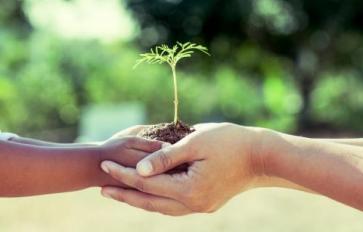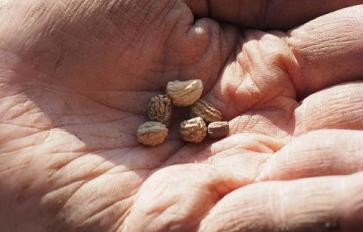
A pulsing bass line drives the crowd that can be seen bouncing up and down across a small inlet of water. A biplane flies overhead every couple of minutes as it makes laps around the scene. Nearby masses of people are gathered in tea huts, on dance floors, in yoga tents, and on the beaches of Woodward Reservoir.
This is Symbiosis Gathering, where thousands of like-minded citizens of our planet Earth have gathered to meet, share, and dance. Amidst all of this jubilant chaos, Dr. Vandana Shiva has come to share her thoughts and wisdom about the state of farming, food, and the socioeconomic injustice we have in the world today:
“Industrial food is the war against humanity,” said Dr. Vandana Shiva to several hundred organic farm allies sprawled out on the ground. “Because already it has destroyed 75% of the planet–the soil, the water, the biodiversity...”
Having spent over 30 years working with these issues, Dr. Vandana Shiva has direct experience to back her claims, and she’s not the only one making them. To cite one unaffiliated source, The World Wildlife Federation agrees that more than half of Earth’s farmable land has been destroyed by industrial practices.
Soil, water and biodiversity–such is our earthly inheritance–and not just ours but our children’s inheritance, and our children’s children’s inheritance.
This land and its natural proclivity for growth was once all that we were entitled to. Now, shamefully, so much of the land and the waters have been poisoned by the industrial quest for wealth.
There is not a person living who has not been affected by industrial food. Some effects–such as obesity and diabetes–are food related in a tangible way. But others–like poverty, religious strife, or migration–can be hard to recognize for what they truly are: symptoms of an unhealthy, extractive economy. They are symptoms of our industrial food system.
Dr. Shiva referred to recent news about the extremist group called Boko Haram, to give a recent example of industrial agriculture creating conflict. If you search Boko Haram, you’ll likely find that the group’s name roughly translates to “don’t accept western education,” and that the group has allied themselves with ISIS. What you likely won’t read about is the region’s recent history.
Boko Haram originated in the region around what used to be an enormous body of water called Lake Chad. [Lake Chad] “used to be 22,000 square kilometers...until the 80s,” said Dr. Shiva, “and then the commodification...and commercialization of agriculture spread [in the region] and 80% of the water was diverted through dams and irrigation to not reach the lake.” As a result the lake began to dry up. “If farmers don’t have water, if fishermen don’t have water, if pastoralists don’t have water, there will be conflicts. Conflicts that were...converted in the global media into an issue of religious fundamentalism, and I’ve seen this happen again and again and again.”
“On the ground you realize people are struggling for land and water,” Dr. Shiva concluded. “It’s in the very structure of the economic processes that we have to leave displacement and migration.”
How did it come to this?
Dr. Shiva explained that, in particular, two pieces of recently established legislature have allowed corporations to dominate the economic and political functioning of the United States and the world.
“One is Citizens United and the other is Bowman v. Monsanto.”
According to The Sunlight Foundation, “In Citizens United v. FEC, the Supreme Court ruled in a 5-4 vote that the ban on political spending by corporations and unions was unconstitutional.” Essentially, this 2010 ruling has since allowed for corporations to fund politician’s campaigns, and since then corporate funding of presidential campaigns has increased magnanimously. In a country where political decisions are sold to the highest bidder, it is clear to me that we no longer have a functioning democracy.
Bowman v. Monsanto established in 2013 that a patented, genetically modified (GM) seed, no matter where it’s bought or when it’s planted in the field, is a self-replicating machine invented by the patent holder (Monsanto) and its presence anywhere without the patent holder’s permission is theft.
Years prior, in 1987, Dr. Shiva was invited to attend a meeting about industrial agriculture in Geneva. At that point, corporations in the food and agricultural industries were looking to increase their profits. Their research was showing that the way to make the most money was to obtain ownership of seeds so that they could collect royalties from every seed sold. These corporations reasoned that the only way they could claim royalties on naturally occurring seeds was to obtain patents on them, and the only way to claim patents on living organisms was through genetic engineering. So that is exactly what they did–and by donating generously to numerous politicians, they ensured their plan’s success. “They pushed GMOs only to collect rents through patenting–that was the only objective,” Dr. Shiva said.
So bioengineers got to work putting Roundup (a proprietary herbicide made by Monsanto) resistant genes into common food crops–for example–for the practical purpose of allowing Monsanto to obtain a patent on their particular breeds of wheat, soy and corn seeds.
Dr. Shiva was witness to the so-called “green revolution” in India in the 80s, in which industrial and chemical agriculture practices were introduced by Monsanto and related companies and sold with the promise of increasing food productivity.
The result was that farmers were tricked into a cycle of needing to buy more and more seeds as well as more and more pesticides and fertilizers to grow them. After only a few years lands were devastated, rivers were poisoned by chemical runoff, and related health issues became widespread. Seeing their homeland and livelihood destroyed by something they had participated in, local farmers were left in despair. Unfortunately, some 300,000 farmers’ suicides are linked to the event.
This tragedy was not an isolated event. Fueled by our extractive economy and industrial food system, this phenomenon repeated to various degrees in countries all over the globe.
Since its creation, industrial and chemical agricultural practices have harmed local economies, people and ecosystems. Meanwhile our failing democracy allows for the perpetuation of these problems, because the corporations who profit from these destructive practices continue to pay for our presidential campaigns.
Neither of the presidential candidates we have today raises the issue of what we are going to do to change our extractive economy into one which is renewable, or how we can rebuild our democracy to be representative of the voices of living beings rather than the influence of a few money hungry vampires.
What we must do
As Dr. Shiva carefully explains in her books Soil, Not Oil, and Earth Democracy, organic agricultural practices can rejuvenate soil, ecology and local economies.
As individuals we must put our best efforts forward in boycotting industrial foods (especially GMOs). Simultaneously, we must tend to our lands organically, and practice renewable cultivation. If we are able to grow our own food, and if we can find ways of living without participating in the globalized, extractive economy, then the empire has already fallen.
These are not new ideas. Ghandi’s message was the same when he took up using the spinning wheel to weave his own cloth. There is no controlling a people who are capable of providing for themselves. We always have been capable, it’s just as of recently that we’ve forgotten.
Seeds are part of the natural bounty of this planet. For corporate entities to try to control their use is an offense against humanity. As citizens of earth, Dr. Shiva says it is our duty to demand our natural inheritance: fertile soil, clean water and air, and the ability to connect with the natural cycles of nature.
We need to rebuild an earth-based democracy–one which values life, sharing and giving back to the earth. We need to save seeds, to participate directly with the earth’s natural cycles, and to again find the balance between our needs and our relation to nature.
Dr. Shiva concluded with an uplifting Mexican proverb, “They thought they had buried us. They forgot, we are seeds.”


